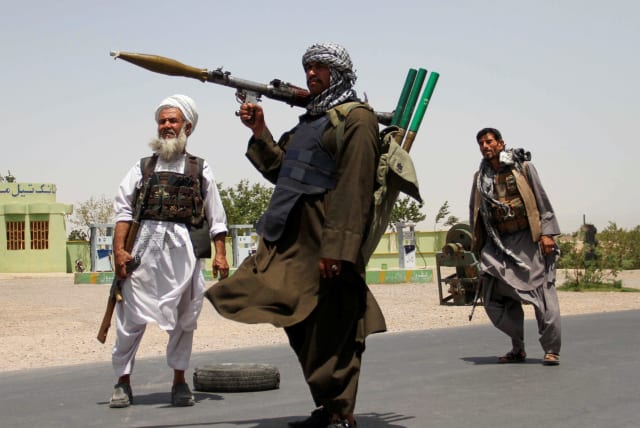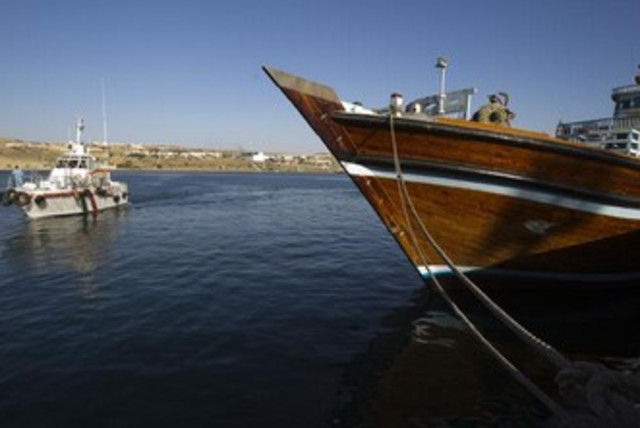Afghanistan invests $35M in Iran’s Chabahar seaport

Experts say that the move from Kabul to Iran’s Chabahar Port sends ripples of change across the economic currents of South Asia. Pakistan should streamline border procedures to reduce delays.
Amid growing trade relations between Iran and Afghanistan, the Taliban government declared a $35 million investment in Iran’s southern port of Chabahar.
This project is considered a crucial step forward for war-torn Afghanistan as it will strengthen the country’s commercial capacities and grant it better access to international waterways.
The declared investment, which underlines the expanding economic ties between Iran and Afghanistan, followed a high-level Afghan delegation that recently visited Tehran.
Hassan Kazemi Qomi, Iran’s ambassador to Afghanistan, confirmed in a statement that “with the investment of $35 million, construction of various projects have started, including commercial and trade complex.”
There are also plans to develop a 25-story residential skyscraper in Chabahar, according to media reports, which also assert that a special economic zone for Afghanistan is being established at Chabahar Port that will reportedly lead to an increased volume of trade between the two countries.
The Taliban’s strategic decision to sidestep Pakistan by investing in Iran’s seaport represents a major step toward the Afghan government’s goal of diversifying its trade and economic partnerships outside its traditional links with other neighboring countries.
Mohammed Suhail Shaheen, head of the Islamic Emirate of Afghanistan’s Doha-based Political Office, told The Media Line: “Our trade with Pakistan indeed surged after foreign forces left Afghanistan, but regrettably, Pakistan laid barriers in the way of our trade.”
“In addition, a lot of the products we want to import through [Pakistan’s] Karachi Port have been placed [on the] negative list, so we were forced to other trade lines,” he added.
Afghanistan may now access global markets through Chabahar Port, eliminating the need to depend solely on its close neighbors, including Pakistan.
Significance of this step for trade
The Afghanistan-Iran border is 572 miles in length and runs from the tripoint with Turkmenistan in the north to the tripoint with Pakistan in the south.
Chabahar is Iran’s first deep-water port in the Gulf of Oman, which places Iran on the map of major oceanic commerce routes. The port, situated in Sistan, one of Iran’s least developed provinces, is approximately 106 miles away from Pakistan’s Gwadar Port, east of the country’s border with Iran.
Given the strategic significance of Chabahar to both Iran and India, the latter has shown keen interest in the port project and has contributed significant financial resources to building it.
The new port may help Tehran ward off the effect of Western sanctions and offer New Delhi an alternative route that bypasses Pakistan. This will prove beneficial as Pakistan does not grant India land access for trade with Afghanistan and Central Asia.
Analysts claim that by tapping into the Iranian port, the Taliban’s investment will open up Afghanistan’s landlocked country to global markets.
Karachi-based veteran defense and geostrategic analyst Adeeb Uz Zaman Safvi told The Media Line: “Afghan Taliban’s decision to invest in Chabahar Port aligns with its strategy of diversifying trade and economic partnerships. By doing so, Afghanistan aims to reduce its dependence on traditional links with neighboring countries, particularly Pakistan.”
Safvi, a retired Pakistan Navy captain and a graduate of the US Naval War College, added that “Chabahar has been a strategic port for Iran, providing access to the Indian Ocean and serving as a key gateway for trade with Afghanistan and other Central Asian countries.”
Historically, Afghanistan has relied heavily on Pakistan for trade routes and access to the sea. However, according to Safvi, the Taliban’s move to invest in Chabahar Port “signifies an attempt to decrease its economic reliance on Pakistan and seek alternative routes and partners.”
He added that “the development may have broader geopolitical implications, impacting regional power dynamics. It could lead to a realignment of economic and strategic interests in the region, with Iran gaining influence over trade routes and economic activities involving Afghanistan.”
The Taliban’s investment in Chabahar Port and the establishment of a special economic zone signify a strategic shift in its economic and geopolitical approach. “The move has the potential to reshape regional dynamics and provide Afghanistan with new avenues for economic growth and trade partnerships,” Safvi concluded.
Previously, more than 80% of Afghanistan’s trade was through Pakistan, but because of Pakistan’s border closure and increased road taxes, among other obstacles, Afghan traders have turned to alternative routes to Iran and Central Asian states.
Khan Jan Alokozay, the deputy head of Afghanistan’s Chamber of Commerce and Investment Cell, explained to The Media Line that the reason for the alteration in the transit route from Pakistan to Iran was that “Islamabad had imposed a new tax in October 2023, which badly affected the movement of Afghan businessmen.”
According to Alokozay, “The Karachi port is the closest and cheapest transit route to Afghanistan, but the restrictions imposed by Pakistan have forced Afghan traders to change the route. Recently, thousands of containers were delayed at the Karachi port, which eventually caused huge financial losses to traders.”
Relations between Pakistan and Afghanistan have already been deteriorating because Pakistan attempted to combat cross-border terrorism and other security issues, including the removal of undocumented Afghan refugees from Pakistan and tighter border restrictions.
In October 2023, Islamabad held a firm stance that Afghan nationals were implicated in the ongoing acts of terrorism that occurred in the country and initiated the forced deportation of around a million undocumented Afghan citizens who were living there.
Sources speculate that Kabul’s investment move comes despite the backdrop of Tehran’s recent tough policy decision, mirroring Islamabad’s, to expel many undocumented Afghan residents living illegally in Iran.
Iran’s National Security Council banned the travel of Afghans to 16 provinces in Iran and their residence and employment in these provinces.
Although both countries claimed that this operation was directed at all aliens without distinction, most of its targets were Afghan refugees.
Kabul launched a fierce backlash and initiated covert diplomatic outreach as soon as the deportations commenced.
While Pakistan maintained its hardline position toward Afghan refugees, Tehran surprisingly responded by halting the deportation of Afghan individuals. They are now permitted to remain in Iran indefinitely, according to a deal between Kabul and Tehran.
Iranian Interior Minister Ahmad Vahidi stated that “identity papers have been issued for more than one million Afghans with plans to include more.” According to Vahidi, Iran was home to an estimated five million Afghans.
“In the shifting landscape of regional geopolitics, the recent move by the Afghan government in Iran’s Chabahar Port sends ripples of change across the economic currents of South Asia,” Saddam Hussein, a research economist and public policy analyst at the Pakistan Institute of Development Economics in Islamabad, told The Media Line.
“This bold step signifies Afghanistan’s determination to forge new economic avenues beyond its immediate neighbors, particularly through the exploration of alternate trade routes,” Hussein added.
“As the Afghan gaze turns toward Chabahar, Pakistan finds itself at a pivotal crossroads, confronting both challenges and prospects in equal measure,” he said.
“For decades, Pakistan has stood as a linchpin in Afghanistan’s trade dynamics, serving as the primary transit route for over 80% of its commerce. Yet, as geopolitical tides ebb and flow, Kabul’s pursuit of alternative pathways has led it to the strategic shores of Chabahar.”
He warned that beyond economic considerations, Afghanistan’s bypassing of Pakistan may strain diplomatic ties between Kabul and Islamabad. “To navigate this delicate terrain, Pakistan must engage in constructive dialogue with Kabul, fostering mutual understanding and cooperation,” Hussein urged.
“The potential increase in Afghanistan’s investment in Iran could have various impacts on Pakistan’s business landscape, and it’s essential for Pakistan to carefully navigate these developments,” Jazib Mumtaz, a Karachi-based senior research economist and analyst at the Policy Research Unit—Federation of Pakistan Chambers of Commerce & Industry, told The Media Line.
Mumtaz explained that Afghanistan’s exploration of alternative trade routes through Iran could divert some trade away from Pakistan. “This may impact sectors that heavily rely on transit trade with Afghanistan, such as logistics, transportation, fruits and vegetables, and storage.”
As such, Mumtaz emphasized that “Pakistan should streamline customs and border procedures to reduce delays and simplify paperwork. Invest in technology and infrastructure to enhance efficiency at border crossings. Establish dedicated lanes for commercial traffic to expedite the movement of goods.”
Jerusalem Post Store
`; document.getElementById("linkPremium").innerHTML = cont; var divWithLink = document.getElementById("premium-link"); if (divWithLink !== null && divWithLink !== 'undefined') { divWithLink.style.border = "solid 1px #cb0f3e"; divWithLink.style.textAlign = "center"; divWithLink.style.marginBottom = "15px"; divWithLink.style.marginTop = "15px"; divWithLink.style.width = "100%"; divWithLink.style.backgroundColor = "#122952"; divWithLink.style.color = "#ffffff"; divWithLink.style.lineHeight = "1.5"; } } (function (v, i) { });

